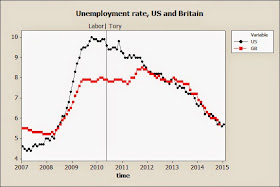It occurred to me that there are data on parent's and children's position in the income distribution which could be used to determine how strong the correlation "should" be. The data, which I discussed in a post about a year ago, are from the Equality of Opportunity Project, which derived them from income tax returns. There are two variables: parent's position in the income distribution when you were growing up (I think it was at about age 15), and your position in the income distribution at age 30. Both are percentiles, so they range from 1 to 100.
If you call parent's percentile P and children's percentile C, you can create a variable C minus P, that represents change from parent's position. It ranges from -99 (someone whose parents were at the top and falls to the bottom) to +99 (parents were at the bottom and rises to the top). The correlation between P and (C-P) is -.58, far larger than the correlation between income and expectations. That means that high income parents are too optimistic, or low income parents are too pessimistic, or both.
To make this more concrete, people with incomes over $150,000 make up about 9% of the Pew sample. 44% of them expect their children to have a higher standard of living than they do, and only 22% expect them to have a lower standard of living. People with incomes below $10,000 made up about 7% of the Pew sample. About 65% expected their children to have a higher standard of living and 22% expected them to have a lower standard of living. Of the people whose parents were in the top 9% in the Equality of Opportunity data, only 3% were above their parents position and 95% were below. Of people whose parents were in the bottom 7% in the Equality of Opportunity sample, 85% were above their parents position and about 10% were below.
As I mentioned in my last post, this goes against what seems to be the standard view among social scientists, which is that poor people accept inequality because they are unrealistically optimistic about the prospects of upward mobility. Although it may seem odd that affluent people should be the ones who suffer from "false consciousness," it makes sense (at least to me). People tend to extrapolate from their own experience. If someone has done well, they'll think of the world as pretty benign--if you keep trying, things will work out. If someone hasn't, they'll see the world as a hard place, where something is always happening to stop you from getting ahead.


